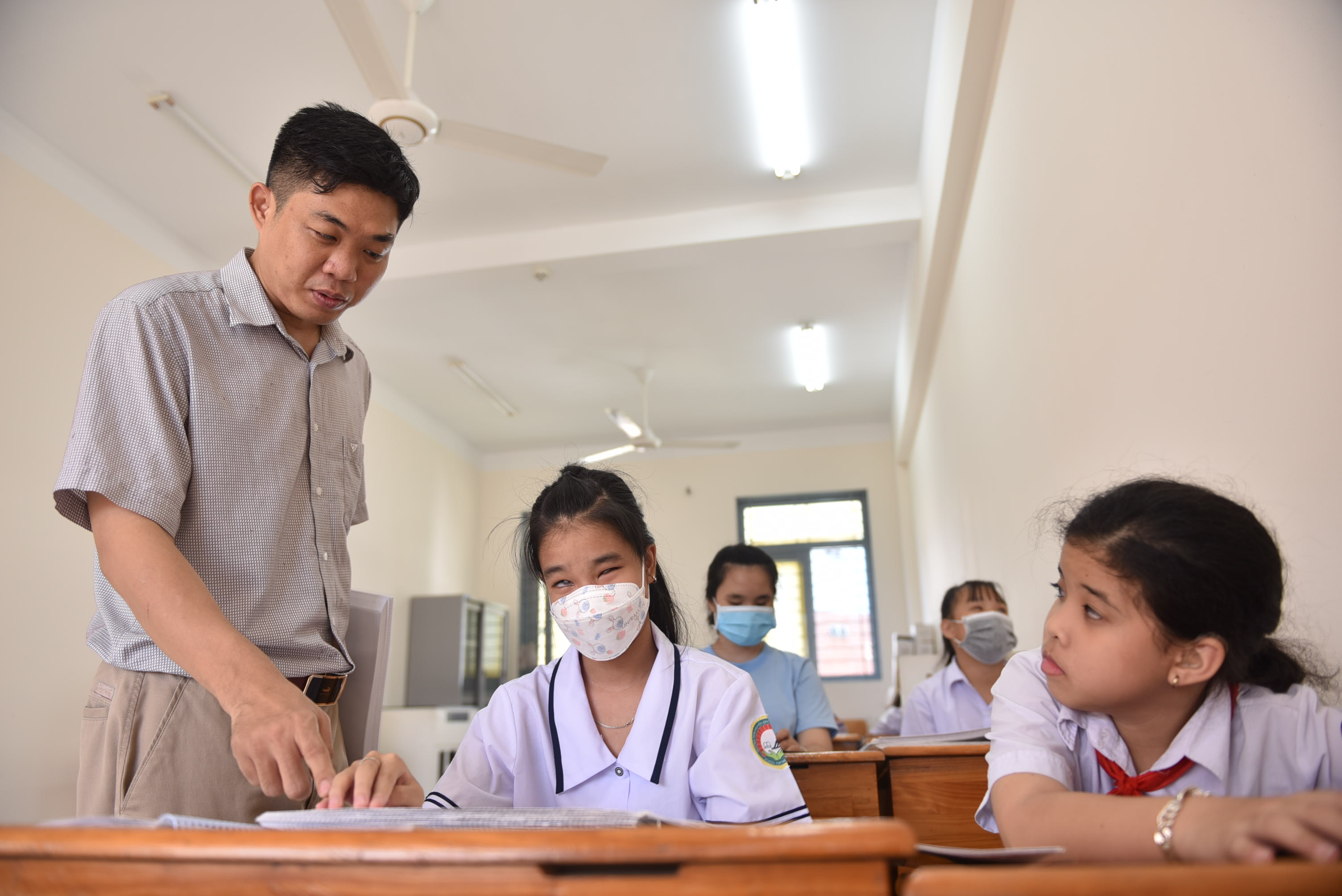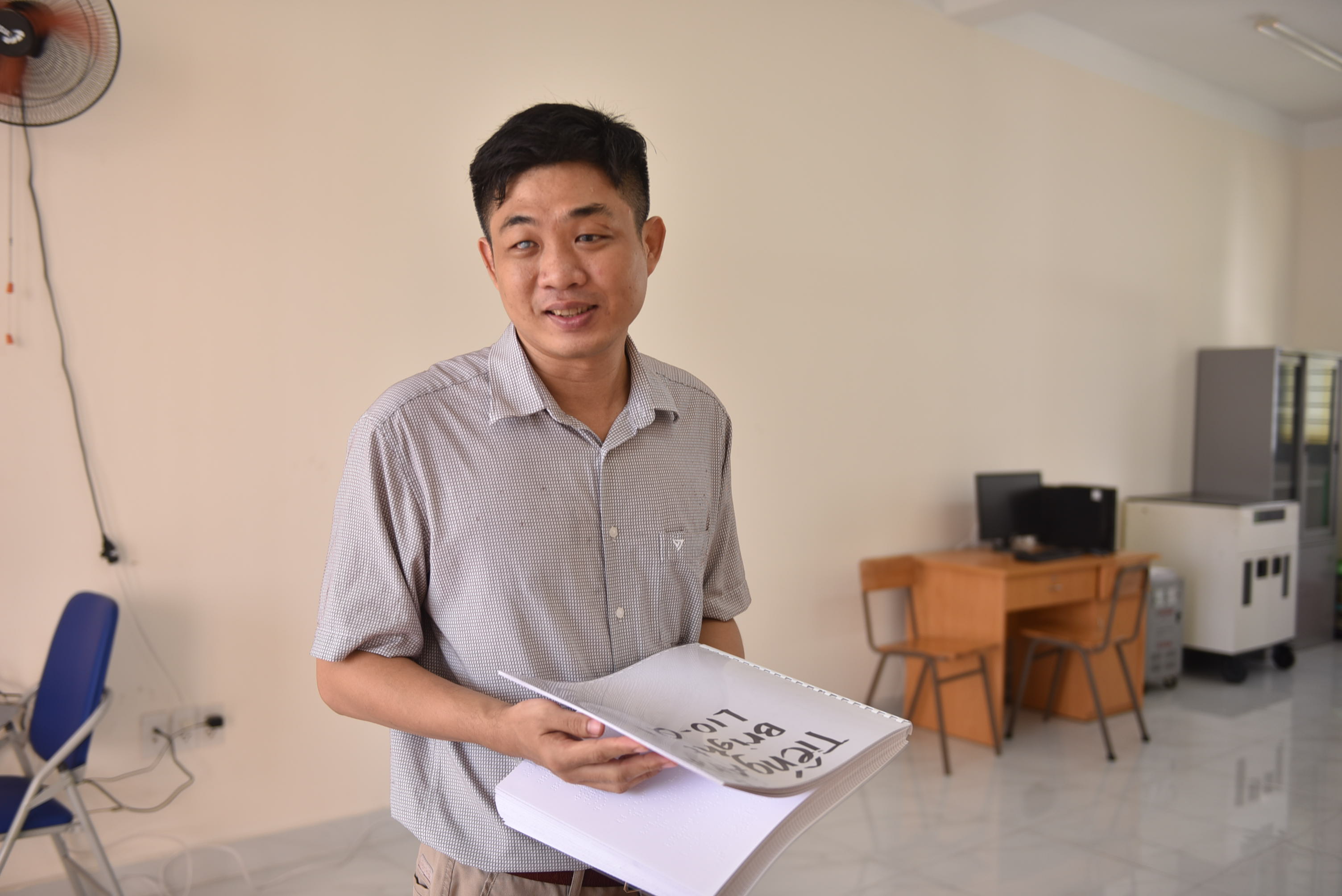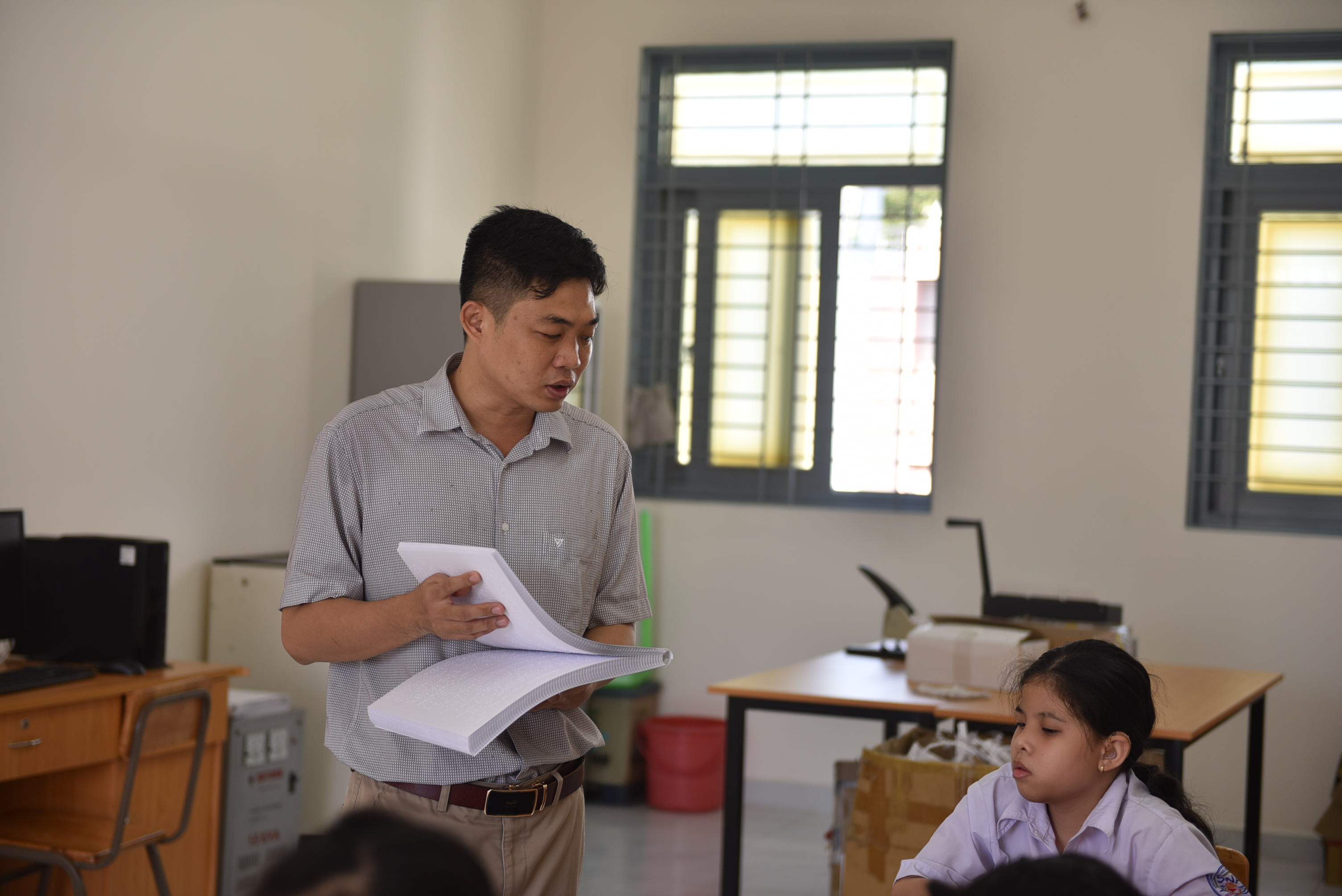More than twenty years ago, Le Hong Vu Minh was a blind student. Today he is an English teacher at the school where he once studied, Nguyen Dinh Chieu School for the Blind in Ho Chi Minh City, but many challenges Minh has faced are quite different.
One day in the past, at the age of ten, Minh found that his eyesight was gradually deteriorating until he could no longer see.
His parents sent him to Nguyen Dinh Chieu School for the Blind in District 10, Ho Chi Minh City to learn useful skills for the blind while trying to find treatment.
Despite their efforts, the exact cause of Minh's blindness has not been determined to this day.
The decision to give back
"As for me, I may be even luckier, because tragedy struck when I was a child," Minh recalled.
"At that time, I was too young to know how terrible blindness would be, so I was not too shocked."
At Nguyen Dinh Chieu School, Minh had the opportunity to meet friends who were going through the same thing, which made him feel very compassionate.
"I was so busy with many things, including finding treatment for the disease and learning life skills for the blind, that I did not have time to feel sad," Minh said.
Over time, the boy who suddenly went blind has grown up step by step, with the love of his parents, the naivety of his childhood, and the strength of his will in his later years.
After attending Nguyen Dinh Chieu School for the Blind for two years, Minh returned to regular school to study with classmates with normal sight.
At the same time, he still attended classes in survival skills at the special school.
In those days, Minh encountered numerous subjects that were 'not for' the visually impaired, such as three-dimensional geometry, one that required him to imagine what they were in his head and to even 'draw' graphs in his mind.
Despite these challenges, he gradually completed all levels of general education and graduated from the Faculty of English Linguistics and Literature at the University of Social Sciences and Humanities under the Vietnam National University-Ho Chi Minh City.
He later won a scholarship to study for a master's degree in special education in Australia.
"Actually, I did not want to be a teacher at first, so I worked in a company after I finished my bachelor's degree. I still kept in touch with the teachers at Nguyen Dinh Chieu School and helped them when I could," Minh said.
"One day I knew my old high school needed an English teacher and felt the job seemed to fit me, so I came back," teacher Minh told of a turning point in his life when he became a teacher at Nguyen Dinh Chieu School for the Blind in 2011.
His decision may come as no surprise, as the old high school has always been a family to him and others.
|
|
| Teacher Le Hong Vu Minh has been blind since he was ten years old, but he has tried to overcome his fate to become an excellent English teacher at Nguyen Dinh Chieu School for the Blind in District 10, Ho Chi Minh City. Photo: Ngoc Phuong / Tuoi Tre |
Knowing that there is no faculty that trains pedagogical methods only for the blind, Minh decided to study at two faculties at the same time in Australia, the Faculty of Education for the Blind and the Faculty of English Teaching, hoping to help students the most.
Minh has tried to learn English before, when there was no Internet. So, he knows how difficult it is for learners to find ways to learn foreign languages.
As a result, he is aware of the many advantages available to today's learners thanks to innovative technological achievements.
Minh has focused on finding the best teaching methods that combine both traditional and innovative approaches to teaching English to his visually impaired students.
"When I was a student, there was only Braille, now there are more tools like computers, audiobooks, and the Internet to help students learn," said Minh.
"I especially admire teacher Minh," said Nguyen Thi Thanh Hue, principal of Nguyen Dinh Chieu School.
"As a normal person with healthy eyes, I find it exceedingly difficult to learn English.
"In contrast, he knows English very well and has effective methods to help blind students learn the foreign language comfortably and normally like sighted students do."
Challenges for educational integration
Minh is not only an English teacher, but also responsible for helping the visually impaired students to participate in classes in a normal school together with healthy classmates, as per Vietnam's policy to encourage the blind to mingle with those with normal sight.
He helps the students find solutions to the problems they may have in class. While playing this role, Minh acts like a brother to the students, according to Hue.
"Students often turn to me to ask about the problems they have attending regular school," Minh said.
"There is a student who had difficulty learning because the teachers only write on the blackboard and he could not see anything, while some others were discriminated against in some cases."
In line with the government's policy in recent years to help the blind integrate into the ordinary education system, the visually impaired have the opportunity to attend a school near their home when they reach the appropriate age.
Although the policy is humane and appropriate, its implementation faces many obstacles.
"Some schools are reluctant to accept blind students because they are not confident in teaching them with the specially required skills. We have tried to help schools overcome these difficulties," Minh said.
He was incredibly pleased with the positive feedback from teachers in these schools, who said that it was no longer a challenge for them to teach visually impaired students after they had acquired the necessary skills.
When Minh told your correspondent about the positive feedback that he received from the teachers at Nguyen Dinh Chieu School, his face brims with joy.
During the three months of summer, Minh and many other teachers at Nguyen Dinh Chieu School did not have a single day off. They had to rush to prepare the new English textbooks in Braille for use in 6th grade in the 2022-23 school year.
Since there are three English books that schools can choose to teach, and the official decision on which books to teach was announced late, the 'translation' of these books into Braille is not yet complete.
Currently, Minh and two other teachers have to continue the remaining work.
"One of the biggest challenges for us in converting English textbooks into Braille is that there are so many pictures," said Minh, explaining the process of creating a Braille textbook.
"We have to decide which photos to keep or remove as long as that does not have a negative impact on the amount of knowledge in the books."
|
|
| Le Hong Vu Minh teaches English to a class at Nguyen Dinh Chieu School for the Blind in District 10, Ho Chi Minh City. Photo: Ngoc Phuong / Tuoi Tre |
Trying to protect students from the 'negative impact' of the Internet
Among the various challenges, Le Ho Vu Minh is most concerned about the negative impact of the Internet on his blind students, although information technology has helped them a lot.
According to him, before the Internet era, the blind spent so much time playing music.
There were many music talents that came out of the visually impaired community.
Nowadays, however, many of them spend their time not only studying and living, but also surfing websites or social media.
Therefore, the number of blind people who have a special talent for music has remarkably decreased, which can be observed by some music teachers at Nguyen Dinh Chieu school.
"I often tell my students that as blind people, we always need much more time to do the same work than normal people," Minh said.
"In other words, we have to try harder to do everything in life, so we had better not waste time on worthless things on the Internet.
"But it's not that simple. We are really trying to fight to protect our students from the bad temptations of the Internet."
Truong Viet Toan, a schoolmate of Le Hong Vu Minh at university, said his friend is an excellent example of strong will and perseverance.
In their years at the University of Social Sciences and Humanities, Minh left his friends with the impression of a person with a good sense of humor who always sees the positive.
"He can take care of himself in everyday life, except when he has to ask others to guide him to school," Toan said.
"But he is incredibly good at remembering the roads. Sometimes I drive him somewhere and he navigates my way."
According to Toan, Minh is an excellent English teacher who has mastered the four skills of listening, speaking, reading, and writing.
He is also enthusiastic about after-school activities, so others sometimes forget that he is blind.
Like us on Facebook or follow us on Twitter to get the latest news about Vietnam!





















































